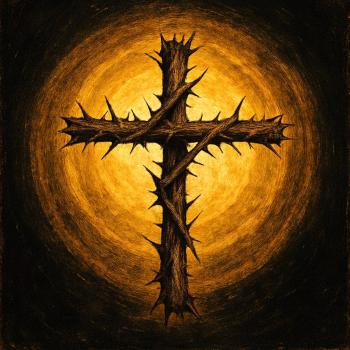This year, I feel grief and anger as we celebrate USA Memorial Day. I feel grief over two mass shootings, fully preventable, in the past two weeks; our nation’s gun lust that puts gun ownership ahead of the common good and the safety of children; and the idolatrous connection of God and guns in some religious communities. I will miss General Colin Powell at the PBS Memorial Day Concert.
Lest you challenge my patriotism and love of nation, I was raised in small town America, where Memorial Day meant parades, flag waving, flowers at the cemetery, and honoring of those who died in service to our nation. It was the Eisenhower era, and we were patriotic, but not jingoistic. We loved our nation, but we recognized that others loved their nations as well. We waved the flag, and affirmed that America was at its best when we worked together for a common cause that transcended our race and religion. We were “cold warriors” but wanted to prevent war. Our politicians were fallible, but we expected dignity and decency, and fair mindedness, from our leaders. We recognized that often there were two sides to every issue, and prized civility over bluster and bullying. We remembered the sacrifices of two World Wars and Korea and knew that citizenship meant sacrifice as well as freedom. While there was racism, there was also a spirit of generosity to immigrants and refugees. In my community, we owned hunting rifles, but we never saw them as domestic weapons of intimidation and war. We also believed in gun safety and well-regulated gun ownership, as the Second Amendment asserts. We couldn’t imagine making teachers security guards.
In considering Memorial Day this year, I believe we need to widen our understanding of the holiday as an affirmation of the importance of sacrifice for ends greater than self-interest and our willingness to join responsibility with freedom for the common.
This year, I have pondered the significant characteristics of those upon whom we depend – parents, grandparents, peacemakers, and peacekeepers. I would go so far as to say that sacrifice is one of primary characteristics of caregivers and protectors and that sacrifice is built into the nature of reality, or at least what it means to live a good life. We let go of certain things, so that greater things may come to pass. We defer gratification, so that others might flourish. We live simply so that others might simply live. We give up our time – and maybe even our lives – to protect the innocent and vulnerable. We may even give up our absolute gun rights to achieve a more perfect union.
Sacrifice is built into the graceful interdependence of life. Contrary to Ayn Rand’s rugged and metaphysically implausible individualism and the anachronistic visions of individualistic Christianity, every achievement an individual makes is grounded in the sacrifices of others; some are sacrifices freely chosen, while others are tragically forced (for example, sweat shops and slavery). In Christian community, sacrifice is essential to the wellbeing of the “body of Christ,” described in I Corinthians 12 as well as Acts 2 and 4. The various parts consciously – and I want to underline the word “consciously” or “willingly” – choose to place their own wellbeing in relationship to the wellbeing of the whole body. The various parts find their wholeness in supporting the wholeness of the totality, which in turn nurtures each individual part. Here we are not talking about co-dependence or masochistic behavior but willingness to expand (and sometimes sacrifice) our understanding of our wellbeing to include the wellbeing of the wider world, whether it is our family, congregation, country, or the planet.
Jesus proclaimed that there is no greater love than giving one’s life for another, and we remember the sacrifices of military as we place flags in cemeteries to commemorate the “ultimate sacrifice.” This isn’t a matter of being a scapegoat, although there is much wisdom in the work of Girard and his followers; but a deeper recognition of one’s responsibility to sacrifice so that others may experience safety, joy, growth, and abundant life. Jesus followed the way of the cross, when other alternatives were possible, I believe, as a working out of his vocation and choice to affirm his calling so that we might have abundant life. Jesus’ sacrifice was neither compelled by God nor predestined but emerged from the alignment of his vision and will with God’s vision for abundant life for all creation. Nor are our sacrifices compelled, but a response to the sacrifices who have gone before us.
Memorial Day has traditionally been about sacrificial living. Beginning first in the years following the Civil War, Memorial Day commemorated those who died in this tragic conflict. After World War I, Memorial Day was expanded to include all who died in service to their country. Initially, just military graves were decorated with flowers. However, over the years, many people also chose to decorate the graves of loved ones – fathers, mothers, children, brothers, and friends – on Memorial Day. This was an acknowledgement that “greater love” has many dimensions that go beyond military sacrifice.
While Memorial Day is a national holiday, it has profound spiritual lessons for us and invites us to deeper loyalties, even beyond nation and family. It is about sacrifice and love of family and nation, not chauvinism and violence. It is about common good not individual selfishness. If Memorial Day has a place in the liturgies or worship services of the church, its place is to inspire gratitude and remembrance for those who have sacrificed life and labor, and time, talent, and treasure, for the greater good.
Regardless of your political and religious views of military service and just warfare, I believe that it is appropriate to remember fallen soldiers and first responders in Christian worship on Memorial Day weekend. The spiritual dimension of their sacrifice is that they looked beyond their own self-interest, even as they climbed the steps of the World Trade Center, protected an Afghan family, or guard our nation’s coastline or skies. In saying “yes” to their vocation, they knew it might place them in harm’s way. We also affirm the sacrifice of civil rights marchers, advocates for hospitality to refugees, and doctors and nurses who place themselves in harm’s way that people in war-torn lands receive medical care. Yet, we must equally affirm that they sacrificed so that our children will not be sacrificed at the temple of bloodlust, individual self-interest, faux freedom, and profit-making.
The sacrificial love remembered on Memorial Day is about vocation and choice, rather than co-dependence and aggrandizement. As we look at the vocation of those who sacrifice on our behalf, we are challenged to beyond our individualism, narcissism, consumerism, and self-interest – and includes “American exceptionalism” or “America first” or “Second Amendment” ideologies – to embrace the wellbeing of others, including the planet. We can celebrate our nation’s fallen heroes without being nationalistic. In fact, we must go beyond nation to balance patriotism with world loyalty and sacrifice largess and convenience for the healing of the planet.
Memorial Day is about remembering, and then dedicating our own lives to a larger, greater good for those we love, our nation – and this may mean protesting against gun violence, anti-democracy legislation, injustice based on sexuality, gender, and color, and enmity to immigrants – and the planet as a whole. Sacrifice, not self-interest, is the heart of Memorial Day.
As you ponder Memorial Day, take time to ask the following questions: What sacrifices are you called to make for the greater good – in your family, among your circle of friends, and in your congregation, community, and nation? What sacrifices are you called to make for the vulnerable people in our land and across the globe? What sacrifices are you called to make for this good earth? How will you look beyond your own well-being to ensure the well-being of other peoples’ children, persons with medical risks, law-abiding immigrants, refugees, the safety of children, and the flora and fauna of our planet? In your responses, you will discover the meaning of Memorial Day.
+++
Bruce Epperly is a “retired” professor, pastor, and author of over sixty books including THE ELEPHANT IS RUNNING: PROCESS AND OPEN AND RELATIONAL THEOLOGIES AND RELIGIOUS PLURALISM; MYSTICS IN ACTION: 12 SAINTS FOR TODAY; PROPHETIC HEALING: HOWARD THURMAN’S VISION OF CONTEMPLATIVE ACTIVISM; PROCESS THEOLOGY AND POLITICS;and 101 SOUL SEEDS FOR PEACEMAKERS AND JUSTICE SEEKERS.
















